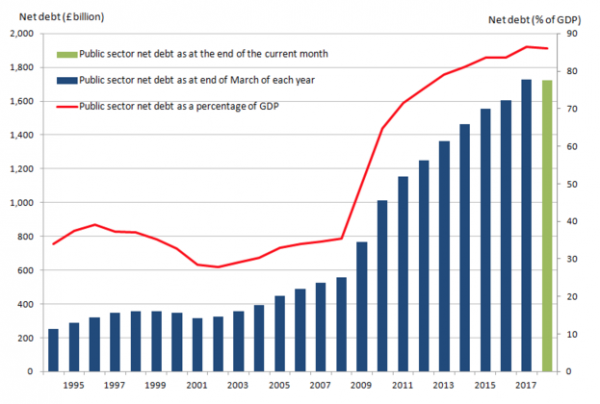Aug 12th 2019, 19:22
Blog 12th August 2019
In this week’s blog, I refer to: HM Treasury, Spending Review, Sajid Javid, NHS, Police, Schools, Local Government, Housing, Office for National Statistics, Bank of England, Brexit, BBC, Institute for Fiscal Studies, Chartered Institute of Public Finance & Accountancy, Local Government Association, Local Government Information Unit, Public Finance, seminars & training.
Last week HM Treasury confirmed that it was abandoning medium-term financial planning, cancelling the planned 2019 comprehensive spending review and instead would carry out a one-year spending review.
No private company, local authority, housing association or other reputable organisation would take such an irresponsible short-term approach to its financial management. Combined with its approach to cutting taxes, its commitments to increase expenditure on politically popular projects, all funded through unaffordable borrowing; this surely demonstrates that, when it comes to financial management, this must be the most irresponsible United Kingdom government in living memory.
Following the announcement, Sajid Javid, the Chancellor of the Exchequer, told the BBC that:
"I want to make sure all departments, including my own, are very focused on our priority which is to make sure we leave the European Union on October 31st. That's why I'm having a one-year spending round so we can just get focused on our priority… But I'm confident that in that spending round that we'll be able to meet all our priorities and that certainly means increased focus on the NHS, on police and on schools… I'll be a chancellor to make sure that our country continues to live within our means."
We will have to wait until the results of the review are announced before we know whether it will provide enough resources for the National Health Service, Police, Schools, Local Government, Housing and the many other competing yet under-funded public services. However, all these services need to be planned over a longer timescale than one year, so however much is provided for 2020/21, long-term planning of public services will be rendered impossible.

Pinderfields Hospital in Wakefield. The NHS may get more resources but it will not be able to do any medium- or long-term financial planning.
I also find the observation about making sure that the country continues to live within its means quite remarkable because:

United Kingdom Government Debt - 1994 to 2018 - It has increased from 40% of GDP to 90%
Tony Consignors, political correspondent at the BBC reports that:
“Some public services - for example, health and the police - may be offered more money. There may also be extra cash to deal with the potential fallout from a no-deal Brexit… But the decision also makes it harder for public services to plan for the longer term… There's also the risk that the spending taps might be turned off as quickly as they're turned on.”,
Ben Zaranko, a research economist with the Institute for Fiscal Studies, told the BBC that:
"If you're a head teacher or head of a police force, if you're trying to work out who to hire or whether to invest in a piece of equipment, it helps to know what your budget is going to be into the future… If you have to plan this on a year-to-year basis, it's quite hard."
Rob Whiteman Chief Executive of the Chartered Institute of Public Finance & Accountancy agrees with me that the planning horizon is too short to provide the certainty required for good financial planning and management, and urged the chancellor to ‘reframe his thinking’ to ‘alleviate the fiscal pressures faced by the sector’. He said that:
“Long-term clarity and transparency is vital to ensure financial plans at all levels of government are accurate, efficient and sustainable.”
It is also the case that, if government doesn’t publish its medium-term or long-term financial projections; potential medium-term and long-term financial problems may be concealed. I think we need more transparency in government finances rather than less.
However, many in the public sector are now focusing on lobbying for much needed additional resources. For example, Councillor Jamie Jamieson (Conservative, Central Bedfordshire), Chairman of the Local Government Association, pointed to the funding gap in local government, calculated at £5billion in 2020 and increasing to £8billion in 2025, said that:
“The spending round needs to make securing the sustainability of local services the top priority.”
However, it has already become clear that neither the Fair Funding Review (on which I have worked as an advisor to the Local Government Association) nor the 75% local retention of business rates will be implemented as planned in 2020; and how can councils take long-term decisions when there is no certainty about funding from 2021?
It is expected that the one-year spending review will be announced in September 2019 and I am sure I will comment on it in this blog and may even write a briefing paper. If Jamie Jamieson gets the funding he wants for local government, I would be surprised but delighted. If you would like to be placed on my mailing list so that you will receive an email notification when any briefing paper is published, please contact me at Adrian.waite@awics.co.uk
Meanwhile, Jonathan Carr-West, Chief Executive of the Local Government Information Unit, has been writing in ‘Public Finance’ about the implications of ‘Brexit’ for local government. He said that:
“A no deal Brexit will just heap more uncertainty on councils already working in the dark. The sheer range of local authority responsibilities means that pretty much whatever goes wrong they will have a role in dealing with it.
“In the run up to the March Brexit deadline they were putting in place traffic management plans, drafting in extra police and working on the assumption that gridlock from the ports would have a knock-on effect on schools, hospitals and other public services. Those plans will need to be reactivated for October.
“Local authorities will be reviewing their plans for public disorder and civil unrest. In the very worst-case scenarios, if we do see shortages of food or medicines councils will be thinking about how they protect vulnerable groups such as children and the elderly… Over the longer term… there are still questions about how far the sudden cessation of free movement effects labour supply – especially in the care sector.”
Our next seminar is on ‘All You Want to Know about Scottish Local Authority Housing Finance’ and will be held in Edinburgh on 17th September. This is a very useful introduction and overview of this important subject. For further information or to make a booking, please click here.